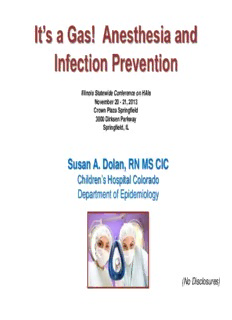
It's a Gas! Anesthesia and Infection Prevention - 5th Annual Illinois PDF
Preview It's a Gas! Anesthesia and Infection Prevention - 5th Annual Illinois
It’s a Gas! Anesthesia and Infection Prevention Illinois Statewide Conference on HAIs November 20 - 21, 2013 Crown Plaza Springfield 3000 Dirksen Parkway Springfield, IL Susan A. Dolan, RN MS CIC Children’s Hospital Colorado Department of Epidemiology (No Disclosures) Acknowledgements • Children's Hospital Colorado Department of Anesthesiology • Children’s Hospital IPs – Gail Potter-Bynoe, Boston – Joan Heath, Seattle – Renee Watson, Atlanta • Child Health Corporation of America Infection Prevention Directors Forum Anesthesia ☺ 2011 Robin Stackhouse, MD Dept of Anesthesiology Univ. of California San Francisco http://www.asahq.org/For-Members/Standards-Guidelines-and-Statements.aspx#rec Contents • Hand Hygiene • Safe Injection Practices/Medications • SSI • Intravascular catheter-related infection • VAP • Neuraxial infection • MDRO • Pediatrics • Management/Disinfection of Equipment • Occupational transmission – BBP – Isolation – TB – Emerging Infectious Diseases – PPE - respirators Contents • Hand Hygiene • Safe Injection Practices/Medications • SSI • Intravascular catheter-related infection • VAP • Neuraxial infection • MDRO • Pediatrics • Management/Disinfection of Equipment • Occupational transmission – BBP – Isolation – TB – Emerging Infectious Diseases – PPE - respirators Hand Hygiene “Quantification of anesthesia providers’ hand hygiene in a busy metropolitan operating room: What would Semmelweis think?” Department of Nurse Anesthesia/Anesthesiology Virginia Commonwealth University Medical Center, Richmond, VA. • Hand hygiene – prior to first interacting with the patient – prior to donning sterile gloves – after any invasive procedure – after manipulation of the airway (e.g. artificial airway placement, suctioning) – after hanging a blood product – after touching the patient for surgical positioning – after patient handoff – after retrieving a soiled or dropped item off the OR floor • Gloving • prior to arterial or IV line placement or other invasive procedure • gloving before and hand cleansing after suctioning of the airway Biddle C, Shah J. AJIC 2012:40(8):756-9 Major categories of failure 1. Moving between/among patients during the preoperative assessment phase. 2. Before, during, and after pain service interventions (e.g. placing perioperative nerve blocks). 3. Keyboard use with soiled hands when using electronic medical record keeping. 4. During the placement of IV and blood draws. 5. Preparing drugs and equipment for the case to follow with soiled hands. 6. Soiled gloves left on after airway manipulations. – endotracheal intubation, suctioning of the airway, laryngeal mask airway insertion, and others. 7. Soiled gloves left on after Foley catheter or central or arterial line manipulation. 8. Other: picking up something off the floor (e.g. pen, tape roll, tongue blade, suction catheter) and using it. Biddle C, Shah J. AJIC 2012:40(8):756-9 • Results: – Nearly 8,000 HH opportunities were observed. – Aggregate failure rate was 82% with a range of 64% to 93% by provider group. • Conclusion: – HH was very poor among anesthesia providers. – The “task density of anesthesia” care may conspire with an intrinsic HH failure rate to create great opportunity for horizontal and vertical vectors for nosocomial infection. Biddle C, Shah J. AJIC 2012:40(8):756-9
Description: